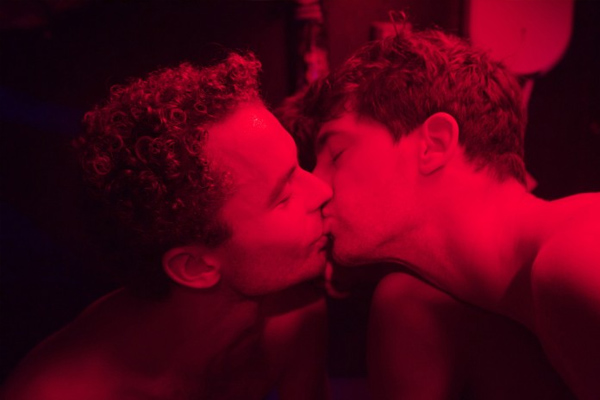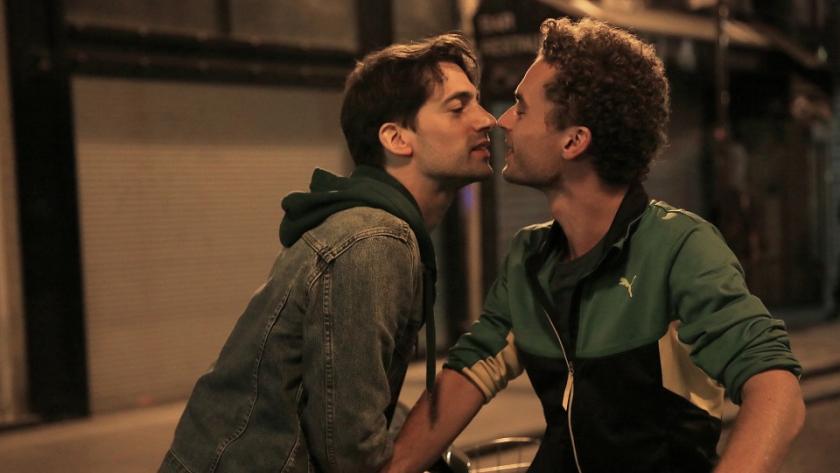Olivier Ducastel and Jacques Martineau have described the budget on which they made their latest film Theo & Hugo – the French directors have been collaborators, as well as partners, since the mid-1990s – as a “pirate” one, its restrictions imposed not least by the fact that they had written a first sequence so sexually explicit that they believed it closed access to the usual public funding sources even in France. The film’s opening 20 minutes certainly have a bracing explicitness that put it almost on the boundary with pornography, although what follows morphs into a rather tender gay two-hander, atmospherically set in a deserted, night-time Paris, that has rightly earned comparisons with Andrew Haigh’s no less important recent British gay movie Weekend.
'Paris belongs to us' could almost be a subtitle for the film
Set in a sex club, that opening is virtually wordless – we learn from one of this release’s extras, however, that its visual cues and dynamics were detailed in 14 pages of script, no improvisation – as an almost acrobatic action plays out in which titular protagonists Theo (Geoffrey Couet) and Hugo (Francois Nambot) are gradually drawn to one another amidst the stylised (but finally not exactly pornographised) melding of copulating male bodies (that encounter, pictured below). But it’s what happens after they emerge into the night that provides the real, and rather more traditional centre of the drama.
The shadow of HIV and AIDS on modern gay life has been a continuing preoccupation in Ducastel and Martineau’s work from the beginning, and it becomes a dominant plot element here when it transpires that the couple’s initial passionate coupling had been unprotected. That immediately throws their growing connection into a new perspective, and also directs the immediate action as they seek the essential PEP, or post-exposure prophylaxis, which makes for a measured central scene set in the almost empty A&E department of a Paris hospital.
 They may have a shared purpose for that moment – the film’s French title, Theo & Hugo dans le meme bateau, brings home how they are temporarily indeed “in the same boat” – but it’s the rather freer element of their nocturnal wanderings that really impresses (as does Manuel Marmier’s fluid, atmospheric cinematography). “Paris belongs to us” could almost be a subtitle for the film, as the streets of its northeastern quarters provide a loose backdrop for the couple’s deepening acquaintance; observation of some of the characters they encounter is sensitive, too. Couet and Nambot establish their characters with nicely contrasting touches: the Parisian Theo is reserved, Hugo, an escapee from the provinces, much more impulsive, the latter especially drawing out the writing's humour.
They may have a shared purpose for that moment – the film’s French title, Theo & Hugo dans le meme bateau, brings home how they are temporarily indeed “in the same boat” – but it’s the rather freer element of their nocturnal wanderings that really impresses (as does Manuel Marmier’s fluid, atmospheric cinematography). “Paris belongs to us” could almost be a subtitle for the film, as the streets of its northeastern quarters provide a loose backdrop for the couple’s deepening acquaintance; observation of some of the characters they encounter is sensitive, too. Couet and Nambot establish their characters with nicely contrasting touches: the Parisian Theo is reserved, Hugo, an escapee from the provinces, much more impulsive, the latter especially drawing out the writing's humour.
Extras include an interview with Couet – every actor should try a sex scene once, he says, noting how this role certainly offered him a chance at playing “the sex scene” – and another with the directors has them reflecting on the importance of the casting dynamics between the two main players, as well as how they worked together themselves. The final bonus has Ducastel and Martineau talking to David Stuart of Soho’s 56 Dean Street sexual well-being programme, reflecting on the context of life for gay men today, both as depicted in the film, and found in Stuart’s centre. A breath of fresh air blows through this small film, one that leaves a more lasting impression than its scale might suggest.
Overleaf: watch the trailer for Theo & Hugo















Add comment